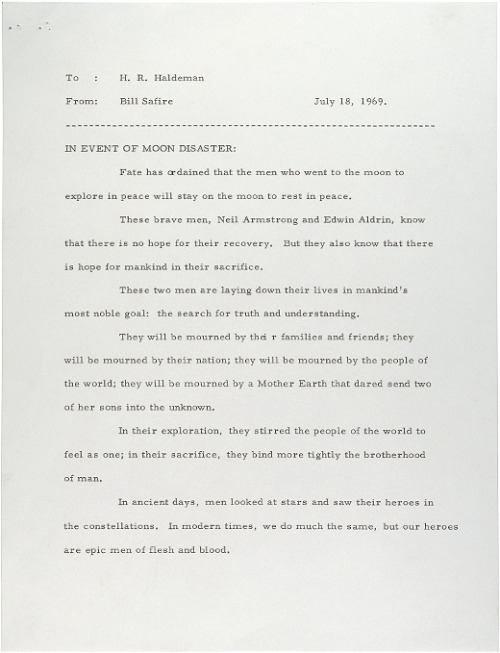45 YEARS AGO TODAY: The Apollo 16 Mission Blasts Off From Cape Canaveral On April 16, 1972.

45 YEARS AGO TODAY: The Apollo 16 mission blasts off from Cape Canaveral on April 16, 1972.
More Posts from Needingsomespace and Others

constellation Cetus
Sufi Latinus (Latin translation of ‘Kitāb al-kawākib al-thābita’ of 'Abd al-Rahmān al-Ṣūfī), Bologna 1250-1275
BnF, Arsenal 1036, fol. 34v

Anelli di Saturno, il grande Titano e Encelado coi suoi geyser di ghiaccio. Un altro grande regalo della Cassini, che sta per concludere la sua missione.










TODAY IN HISTORY: Apollo 12 astronaut Pete Conrad goes to work on the Moon. Photos by Alan Bean, November 19, 1969
The Moon - Incredible Lunar Views From The Japanese SELENE Orbiter - Earthrise
Five Famous Pulsars from the Past 50 Years
Early astronomers faced an obstacle: their technology. These great minds only had access to telescopes that revealed celestial bodies shining in visible light. Later, with the development of new detectors, scientists opened their eyes to other types of light like radio waves and X-rays. They realized cosmic objects look very different when viewed in these additional wavelengths. Pulsars — rapidly spinning stellar corpses that appear to pulse at us — are a perfect example.

The first pulsar was observed 50 years ago on August 6, 1967, using radio waves, but since then we have studied them in nearly all wavelengths of light, including X-rays and gamma rays.
Typical Pulsar
Most pulsars form when a star — between 8 and 20 times the mass of our sun — runs out of fuel and its core collapses into a super dense and compact object: a neutron star.

These neutron stars are about the size of a city and can rotate slowly or quite quickly, spinning anywhere from once every few hours to hundreds of times per second. As they whirl, they emit beams of light that appear to blink at us from space.
First Pulsar
One day five decades ago, a graduate student at the University of Cambridge, England, named Jocelyn Bell was poring over the data from her radio telescope - 120 meters of paper recordings.

Image Credit: Sumit Sijher
She noticed some unusual markings, which she called “scruff,” indicating a mysterious object (simulated above) that flashed without fail every 1.33730 seconds. This was the very first pulsar discovered, known today as PSR B1919+21.
Best Known Pulsar
Before long, we realized pulsars were far more complicated than first meets the eye — they produce many kinds of light, not only radio waves. Take our galaxy’s Crab Nebula, just 6,500 light years away and somewhat of a local celebrity. It formed after a supernova explosion, which crushed the parent star’s core into a neutron star.

The resulting pulsar, nestled inside the nebula that resulted from the supernova explosion, is among the most well-studied objects in our cosmos. It’s pictured above in X-ray light, but it shines across almost the entire electromagnetic spectrum, from radio waves to gamma rays.
Brightest Gamma-ray Pulsar
Speaking of gamma rays, in 2015 our Fermi Gamma-ray Space Telescope discovered the first pulsar beyond our own galaxy capable of producing such high-energy emissions.

Located in the Tarantula Nebula 163,000 light-years away, PSR J0540-6919 gleams nearly 20 times brighter in gamma-rays than the pulsar embedded in the Crab Nebula.
Dual Personality Pulsar
No two pulsars are exactly alike, and in 2013 an especially fast-spinning one had an identity crisis. A fleet of orbiting X-ray telescopes, including our Swift and Chandra observatories, caught IGR J18245-2452 as it alternated between generating X-rays and radio waves.

Scientists suspect these radical changes could be due to the rise and fall of gas streaming onto the pulsar from its companion star.
Transformer Pulsar
This just goes to show that pulsars are easily influenced by their surroundings. That same year, our Fermi Gamma Ray Space Telescope uncovered another pulsar, PSR J1023+0038, in the act of a major transformation — also under the influence of its nearby companion star.

The radio beacon disappeared and the pulsar brightened fivefold in gamma rays, as if someone had flipped a switch to increase the energy of the system.
NICER Mission
Our Neutron star Interior Composition Explorer (NICER) mission, launched this past June, will study pulsars like those above using X-ray measurements.

With NICER’s help, scientists will be able to gaze even deeper into the cores of these dense and mysterious entities.
For more information about NICER, visit https://www.nasa.gov/nicer
Make sure to follow us on Tumblr for your regular dose of space: http://nasa.tumblr.com

Apollo 11 astronauts Neil Armstrong and Buzz Aldrin on the Moon, illustrated in the Houston Post, July 21, 1969.



An address to the nation to be read by President Richard Nixon should the Apollo 11 astronauts become stranded on the moon,
To: H. R. Haldeman From: Bill Safire July 18, 1969. ——————————————————————————- IN EVENT OF MOON DISASTER: Fate has ordained that the men who went to the moon to explore in peace will stay on the moon to rest in peace. These brave men, Neil Armstrong and Edwin Aldrin, know that there is no hope for their recovery. But they also know that there is hope for mankind in their sacrifice. These two men are laying down their lives in mankind’s most noble goal: the search for truth and understanding. They will be mourned by their families and friends; they will be mourned by the nation; they will be mourned by the people of the world; they will be mourned by a Mother Earth that dared send two of her sons into the unknown. In their exploration, they stirred the people of the world to feel as one; in their sacrifice, they bind more tightly the brotherhood of man. In ancient days, men looked at the stars and saw their heroes in the constellations. In modern times, we do much the same, but our heroes are epic men of flesh and blood. Others will follow, and surely find their way home. Man’s search will not be denied. But these men were the first, and they will remain the foremost in our hearts. For every human being who looks up at the moon in the nights to come will know that there is some corner of another world that is forever mankind. PRIOR TO THE PRESIDENT’S STATEMENT: The President should telephone each of the widows-to-be. AFTER THE PRESIDENT’S STATEMENT, AT THE POINT WHEN NASA ENDS COMMUNICATIONS WITH THE MEN: A clergyman should adopt the same procedure as a burial at sea, commending their souls to “the deepest of the deep,” concluding with the Lord’s Prayer.

A model map of the Solar System.

Enceladus striated surface as seen by Cassini .
js
-
 happy-geology liked this · 4 years ago
happy-geology liked this · 4 years ago -
 remark-66 liked this · 4 years ago
remark-66 liked this · 4 years ago -
 crownedstoat liked this · 4 years ago
crownedstoat liked this · 4 years ago -
 inconstantsearchofperfection liked this · 4 years ago
inconstantsearchofperfection liked this · 4 years ago -
 thereyouarewhereveryougo reblogged this · 4 years ago
thereyouarewhereveryougo reblogged this · 4 years ago -
 kingchimera liked this · 4 years ago
kingchimera liked this · 4 years ago -
 noncensitive reblogged this · 4 years ago
noncensitive reblogged this · 4 years ago -
 noncensitive liked this · 4 years ago
noncensitive liked this · 4 years ago -
 chibiusata liked this · 4 years ago
chibiusata liked this · 4 years ago -
 readinglist32 reblogged this · 4 years ago
readinglist32 reblogged this · 4 years ago -
 readinglist32 liked this · 4 years ago
readinglist32 liked this · 4 years ago -
 uncommonidea liked this · 4 years ago
uncommonidea liked this · 4 years ago -
 fungalcoffee reblogged this · 4 years ago
fungalcoffee reblogged this · 4 years ago -
 fungalcoffee liked this · 4 years ago
fungalcoffee liked this · 4 years ago -
 supplyside reblogged this · 4 years ago
supplyside reblogged this · 4 years ago -
 happypeppermintchocolate liked this · 5 years ago
happypeppermintchocolate liked this · 5 years ago -
 longballlu liked this · 5 years ago
longballlu liked this · 5 years ago -
 udendeandre reblogged this · 5 years ago
udendeandre reblogged this · 5 years ago -
 themasterluxfoxwife reblogged this · 6 years ago
themasterluxfoxwife reblogged this · 6 years ago -
 supplyside liked this · 6 years ago
supplyside liked this · 6 years ago -
 ryuunosenshi reblogged this · 6 years ago
ryuunosenshi reblogged this · 6 years ago -
 1aulter reblogged this · 6 years ago
1aulter reblogged this · 6 years ago -
 heoh-gotar reblogged this · 6 years ago
heoh-gotar reblogged this · 6 years ago -
 heoh-gotar liked this · 6 years ago
heoh-gotar liked this · 6 years ago -
 1aulter reblogged this · 6 years ago
1aulter reblogged this · 6 years ago -
 the-man-who-loved-major-kusanagi liked this · 6 years ago
the-man-who-loved-major-kusanagi liked this · 6 years ago -
 unwelcomingseas reblogged this · 7 years ago
unwelcomingseas reblogged this · 7 years ago -
 bypassreality reblogged this · 8 years ago
bypassreality reblogged this · 8 years ago -
 wontbeused reblogged this · 8 years ago
wontbeused reblogged this · 8 years ago -
 the-black-tulip liked this · 8 years ago
the-black-tulip liked this · 8 years ago -
 ohheycolleen liked this · 8 years ago
ohheycolleen liked this · 8 years ago -
 im-ricci reblogged this · 8 years ago
im-ricci reblogged this · 8 years ago -
 perr-m reblogged this · 8 years ago
perr-m reblogged this · 8 years ago -
 perr-m liked this · 8 years ago
perr-m liked this · 8 years ago
